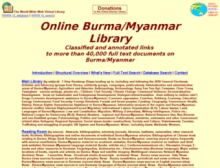Resource information
Up to a million people have fled their homes in eastern Burma in a crisis the world has largely ignored.
Burma's refusal to release Aung San Suu Kyi from house arrest, and the boycotting of the constitutional convention this month by the main opposition, has thrust Burma into the spotlight again.
But unseen and largely unremarked is the ongoing harrowing experience of hundreds of thousands of people in eastern Burma, hiding in the jungle or trapped in army-controlled relocation sites. Others are in refugee camps on the Thai-Burmese border.
These people are victims in a counterinsurgency war in which they are the deliberate targets. As members of Burma's ethnic minorities - which make up 40 per cent of the population - they are trapped in a conflict between the Burmese army and ethnic minority armies.
Surviving on caches of rice hidden in caves, or on roots and wild foods, families in eastern Burma face malaria, landmines, disease and starvation. They are hunted like animals by army patrols and starved into surrender.
In interviews... refugees told Christian Aid of murder and rape, the torching of villages and shooting of family members as they lay huddled together in the fields. They recalled farmers who had been blown up by landmines laid by the army around their crops.
This report, based on personal testimonies from refugees, tells the story of Burma's humanitarian crisis.
On the brink of the Burmese government's announcement of a 'roadmap to democracy' for a new constitution, Burma's Dirty War argues that any new political settlement must include the crisis on the country's eastern borders.
Burma's refusal to free Aung San Suu Kyi promises more intransigence and an even slower pace of change - with predictable human costs.
This report calls on the UK and Irish governments, the EU and the UN to use what opportunity remains from the roadmap to democracy to press for an end to the conflict in negotiations with ethnic minorities.
It also argues that the UN must gain access to the areas in crisis - despite the Burmese government ban on travel there by humanitarian agencies.
Key recommendations include:
* that the Burmese government cease human rights abuses, allow access to eastern Burma by humanitarian agencies including UN special representatives, and engage in dialogue with ethnic minority representatives
* that the UK and Irish governments, the EU and the UN fund work with displaced people inside Burma and continue to support refugees in Thailand
* that the UK and Irish governments, the EU and UN Security Council condemn Burma's human rights abuses against ethnic minorities, demand that it protect civilians from violence and insist that Burma allow access to humanitarian agencies
The report argues that governments must seize the opportunity presented by the roadmap to push for genuine negotiations between the government, the National League for Democracy and ethnic minority organisations which can bring out a just and lasting peace...



